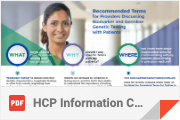
Cholangiocarcinoma Foundation Consortium Moves to Clarify and Promote Consistent Use of Common Terms for Biomarker and Germline Genetic Testing
Improved Communication Is Vital Between Patients and Providers About Testing Needs
WASHINGTON, DC (July 7, 2020) — A LUNGevity Foundation-led consortium of 41 leading patient advocacy organizations, professional societies and industry partners has published a white paper detailing recommendations for the use of testing terminology in precision medicine for patient education throughout the cancer community. Use of consistent language will significantly improve patient awareness and understanding of potentially life-saving testing options available for both new cancer diagnoses and progression or recurrence of disease.
Research shows that despite widespread acceptance of the importance of testing, actual testing rates lag far behind best-practice recommendations for both biomarker testing for somatic (acquired) mutations and other biomarkers, and for germline genetic testing for identifying germline (inherited) mutations (also known as variants). Analysis by The Consistent Testing Terminology Working Group (Working Group) indicates that language disparity is a primary obstacle to patient communication with providers about testing for their specific cancer type. Further, development of consistent language can increase patient understanding and communication, facilitate shared decision making, support value-based care and assure concordance in policy development.
The Working Group is a consortium of 20 cancer patient advocacy groups representing solid tumor and hematologic malignancies, three professional societies, and 18 pharmaceutical and diagnostic companies and testing laboratories. Over the course of many years, multiple activities, led by numerous individual patient advocacy organizations and professional societies, have developed the groundwork for this effort. The Working Group has launched a multi-faceted dissemination and communications effort to ensure that its recommendations and supporting materials are widely available among all key stakeholders within the cancer ecosystem, including providers, patient advocacy organizations, guidelines agencies, payers, and policymakers.
In developing its recommendations, the Working Group, first convened in 2019 by LUNGevity Foundation, identified 33 terms related to biomarker, genetic and genomic testing that were being used in patient education and clinical care within the different cancer communities. In many cases, multiple terms were used to describe the same test. Various testing modalities, the source of testing samples, and the multiplicity of gene mutations currently identifiable by testing, were contributing factors in this often-confusing overlap.
In the final analysis, three umbrella descriptor terms emerged as recommendations from the Working Group’s milestone exploration: “Biomarker testing” was selected as the preferred term for tests that identify characteristics, targetable findings or other test results originating from malignant tissue and blood; “genetic testing for an inherited mutation” and “genetic testing for inherited cancer risk” were selected as consensus terms for tests used to identify germline (inherited) mutations.
“Far too many patients across all cancer types are still missing out on essential tests for biomarkers and inherited mutations indicating cancer risk,” said Michelle Shiller, DO, AP/CP, MGP, Co-Medical Director of Genetics at Baylor Sammons Cancer Center and Staff Pathologist at Baylor University Medical Center. “With rates of biomarker testing and genetic testing for an inherited mutation at sub-optimal levels for numerous patient populations, patients are not benefiting from biomarker-directed care or not learning about their inherited cancer risk. Confusion around testing terms is a driving factor in this undertesting and ultimately has a detrimental impact on patient care.”
Adds Nikki Martin, Director of Precision Medicine Initiatives at LUNGevity Foundation, “When someone is diagnosed with cancer, they’re swept into a whirlwind of bewildering words and complex, pressing decisions. Our Working Group’s goal is to help calm that storm of confusion with clear and consistent language that facilitates communication and medical decision-making. A unified voice and message from providers, industry and the patient advocacy community about testing is absolutely vital to optimal cancer care.”
“The group has been working on this initiative for about a year. However, organizations representing patients have been struggling with inconsistent and confusing terminology for many years. The process was rigorous and highly collaborative, the hope is that the resulting white paper will assist all stakeholders to better educate and support patients, whose treatment options often depend on the results of this testing,” said Stacie Lindsey, CEO and founder of Cholangiocarcinoma Foundation.
An abstract on the Working Group‘s recommendations was published in May 2020 as part of the American Society of Clinical Oncology (ASCO) Annual Meeting Virtual Library.
The White Paper can be viewed in its entirety at www.CommonCancerTestingTerminology.org.
Working Group participating organizations include:
Patient Advocacy: CancerCare; Cancer Support Community; The Cholangiocarcinoma Foundation; Clearity Foundation; Colorectal Cancer Alliance; Fight CRC; FORCE (Facing Our Risk of Cancer Empowered); International Cancer Advocacy Network; Leukemia & Lymphoma Society; The Life Raft Group; Lymphoma Research Foundation; Living Beyond Breast Cancer; Lung Cancer Action Network (LungCan); LUNGevity Foundation; National Lung Cancer Roundtable (American Cancer Society); PanCAN; Personalized Medicine Coalition; Prostate Cancer Foundation; Ovarian Cancer Research Alliance (OCRA); Sharsheret (The Jewish Breast & Ovarian Cancer Community); and, Susan G. Komen.
Professional Societies: Association of Community Cancer Centers (ACCC); Association for Molecular Pathology (AMP); and, National Society of Genetic Counselors (NSGC).
Industry Partners: Abbvie; Amgen; AstraZeneca; Blueprint Medicines; Boehringer Ingelheim; Bristol-Myers Squibb; Caris Life Sciences; Eli Lilly and Company; Foundation Medicine; Genentech; GlaxoSmithKline (GSK); Novartis; Myriad Women’s Health; NeoGenomics; Pfizer; Personal Genome Diagnostics (PGDx); and, Thermo Fisher Scientific.
 Consistent Testing Terminology Whitepaper
Consistent Testing Terminology Whitepaper
 HCP Information Card
HCP Information Card
 Consistent Terms Infographic
Consistent Terms Infographic
“The group has been working on this initiative for about a year. However, organizations representing patients have been struggling with inconsistent and confusing terminology for many years. The process was rigorous and highly collaborative, the hope is that the resulting white paper will assist all stakeholders to better educate and support patients, whose treatment options often depend on the results of this testing,” said Stacie Lindsey, CEO and founder of Cholangiocarcinoma Foundation.